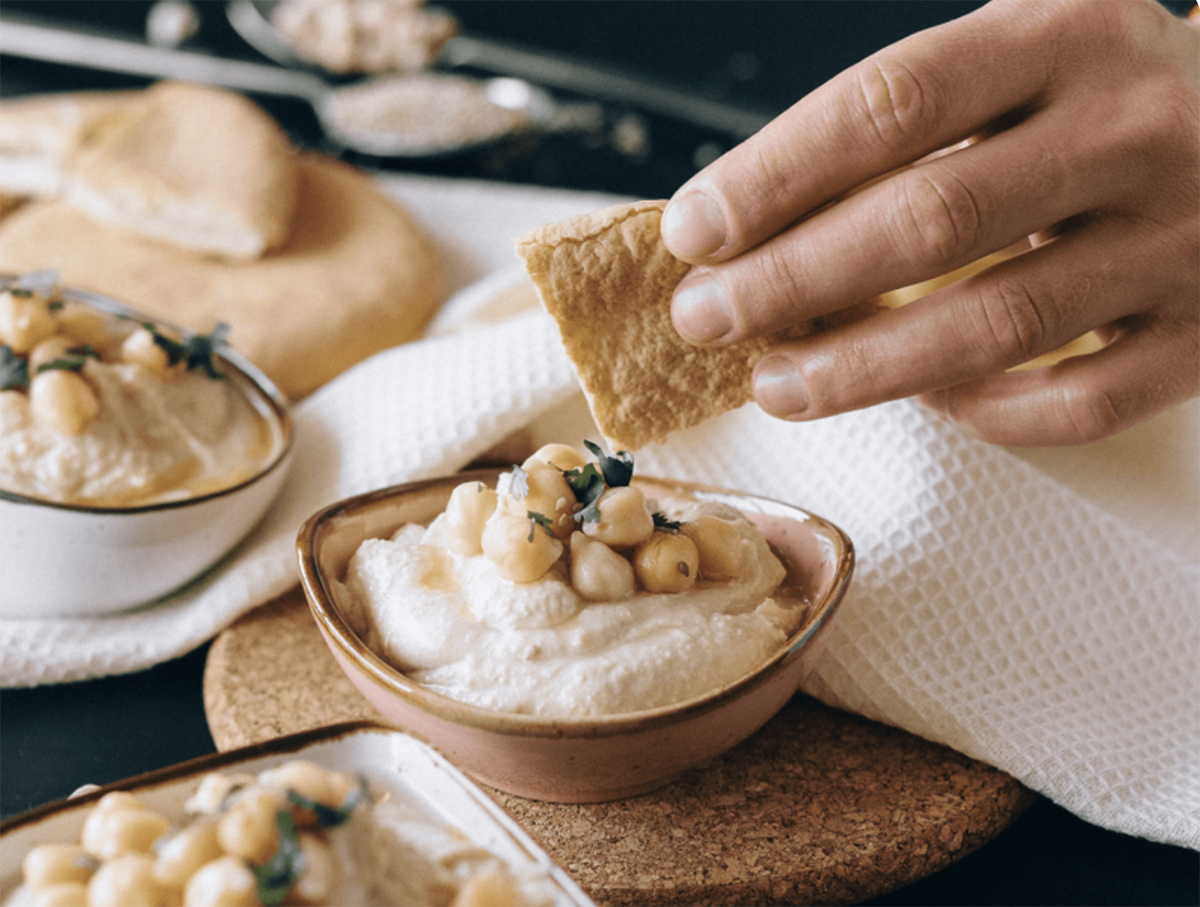July 20, 2022
Israeli company Equinom is renowned for its innovative plant-based ingredients cultivated from AI-driven plant breeding. Jesse Sam caught up with the CEO and CMO to learn more.


Equinom is one of the most exciting companies in the plant-based food space. The Israeli company is making waves with its AI-driven plant breeding techniques and successfully raised $20 million in funding last year. Jesse Sam spoke with Gil Shalev, the company’s Founder and CEO, and Galit Feinreich, its Chief Marketing Officer, to learn more about the company.
Galit Feinreich: Equinom is a food tech company on a mission to cultivate plant-based ingredients that are truly better for people and our planet. The company was founded by Gil Shalev in 2012. His belief in the power of nature led to his creation of one of the world’s most robust seed vaults and our proprietary Manna™ technology platform that enables us to be a valued ingredient innovation partner to food companies around the world.
The inspiration behind the company actually came from roses. Gil was completing a PhD in plant genetics and his thesis was on cross-breeding roses. He wanted to create roses that could last a long time in a vase (like florist roses), but have the rich, perfumey scent of backyard roses. His research used artificial intelligence to mix and match a vast array of rose varieties for the perfect combination. In developing this method, he realised it could be applied to the food system.
GF: Gil first amassed hundreds of seed varieties, primarily of pulses, from around the world and built a state-of-the-art seed vault. He then brought on a team of experts in breeding, biochemistry, bioinformatics, and food science to build out the tech used to speed up – and smarten up – the natural cultivation process to develop new crop varieties. The goal was to develop varieties that are efficient to farm and deliver the taste, nutrition, and functionality we want in our food. His choice to focus on pulses made sense, given that pulses have tremendous potential as affordable, sustainable, and nutritious food crops.
Today, we have over 250,000 varieties of seeds in our seed vault. We use the vault, in conjunction with our Manna™ technology platform, to restore natural biodiversity to our existing food supply – by naturally breeding higher quality, non-GMO pulses optimised for food. With superior crops at their core, our food ingredients require minimal processing and, in turn, create shared value throughout the supply chain to enable food companies to make plant-based food more delicious, nutritious, sustainable and accessible for everyone.
GF: North America is currently our biggest market. We have crops, such as our high protein yellow pea and high protein non-GMO soy, growing as we speak in various locations in the U.S. & Canada. We’re establishing long-term relationships with leading ingredient suppliers and food manufacturers in North America as well. We work with growers in both hemispheres and are also pursuing opportunities across Europe and Asia as we see a tremendous market opportunity for value-added, non-GMO plant protein ingredients in those regions.
GF: Our analysis is that the demand for quality, plant-based proteins is outstripping supply. We want to solve the quality and quantity problem simultaneously by ensuring that our unique ingredients get into circulation quickly using the existing supply chain instead of trying to build a new one from scratch.
To that end, we work with farmers, who buy and grow Equinom seeds, ingredient processors, who convert our grains into ingredients they sell, and food companies, who ultimately purchase the ingredients for use in their food products.

GF: Sure, we have dozens of fantastic partners across the supply chain in various stages of development with us. On the ingredient supplier side, we have relationships with companies including Roquette, the global leader in pea protein and Lovingly Made, the ingredient arm of Meatless Farm – a plant-based meat company operating in 20 countries. Equinom partners with ingredient suppliers to develop pea protein ingredients with excellent functionality in alt-meat and dairy applications (such as high solubility, lower sodium and mild taste) along with significant reductions in greenhouse emissions and water usage.)
Black Sheep is one of the food companies we work with. They are working to incorporate Equinom pea protein in their vegetarian lamb, which is currently sold at a Greek restaurant chain called Souvla, among others.
We also work with food companies to develop customised ingredients with specific functionality traits to fit specific food applications. We’ll be sharing more news about these partnerships in the coming weeks and months, so watch this space.
Gil Shalev: To answer that question, I’d just make a minor but important clarification. We have always been breeders. Formerly, we used our technology to breed seeds. Now, we use that technology to breed better food ingredients. We have always been in the business of producing real, tangible products — first seeds, now food ingredients. The AI-powered algorithm is a means to an end, not just a matching platform. It may seem like a minor distinction but I feel it’s really important to help explain what we do.
GS: We changed our focus from seeds to ingredients because we saw that there was a disconnect between seed breeders and the food industry. The two sectors had grown into silos, when they should be working much more closely.
We recognised that we needed to work closely and directly with the food companies themselves to really understand their needs so we could breed better ingredients from the source. Our Manna™ technology platform is, of course, what enables us to do this faster and smarter. But ultimately we are using the tech to restore natural biodiversity to our food system, not to do any genetic modification. We do not believe that is necessary or most effective for these purposes.
GS: I expect the plant-based market to continue growing and there is a lot of data to support that assessment. But there are still risks and challenges on the horizon. Recently, inflationary pressures have added to the ongoing challenges around supply chain disruptions. That has negatively affected earnings for key players in our industry.
Plant-based food manufacturers are struggling from high input costs. But that is not simply a consequence of the current high cost environment that is affecting everybody; there are deeper structural issues in our industry. We have learned that the biggest cost-driver of plant-based foods is the ingredients. Addressing this will require holistic change to the global food system.
Farmers are the foundation of that system. They need higher quality seeds to plant as well as assurances that their crops will be purchased. Higher up the value chain, food manufacturers need ingredients that meet the health and taste needs of consumers while also improving their bottom line (with more efficient processing). We believe that our ingredients, combined with our integrated approach, can help to unlock the promise of plant-based food.
GF: Russia and Ukraine are both very significant global pulses suppliers. The combination of sanctions against Russian exports and the war’s disruptive impact to Ukrainian production and distribution operations are already impacting the market. Sadly, as is often the case, the countries and regions who already face the most food insecurity suffer the largest impact from resulting shortages and price increases. Equinom crops can address some of these challenges by enabling localized production. This is because our crops are bred to be drought-tolerant, so they can grow in more regions. Our crops are also bred to be nutrient dense, so they require less processing. This can be done inexpensively in local mills rather than requiring transport across oceans to a handful of highly sophisticated (and costly) processing facilities. That would enhance the self-reliance of these countries and increase the overall resilience of the global system.
GS: We’re currently in the process of commercializing our pea and soy proteins in partnership with leading ingredient suppliers. We will be launching in food products in 2023. We’re also developing ingredients from new varieties of other pulses including chickpeas, mung beans, Fava and cowpeas. We expect to commercialize those in the next few years. Needless to say, we’re hard at work and have a lot of exciting, delicious and nutritious new non-GMO plant-based ingredients in the pipeline!
Sounds like it will be a busy few years for Equinom. Thanks for your time Galit and Gil.

Gil Shalev, PhD Founder & CEO / Galit Feinreich, Chief Marketing Officer
Disclaimer: The opinions or views expressed in this publication are those of the authors or quoted persons. They do not purport to reflect the opinions or views of the Global Pulse Confederation or its members.